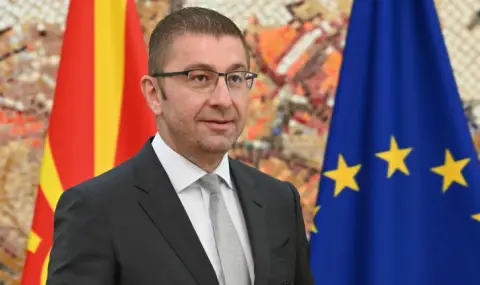The process of European integration is a two-way street, believes the Prime Minister of the Republic of North Macedonia, Hristijan Mickoski, according to whom the question is not whether the politicians in North Macedonia have the will to vote on the changes in the constitution, with which the Bulgarians in the country will be included in the basic law, so that the Republic of North Macedonia can start real negotiations with the EU.
„Citizens, political parties have repeatedly shown their will in the last three decades, the question is whether Brussels has the will to solve this problem. Because if there's a will in Brussels, there's a way," Mickoski said in an interview last night on "Alsat M" television, quoted by BTA.
In his words, he should know what the European Union is planning for the country.
„We have a fully synchronized foreign policy and security policy with the European Union, we constantly monitor the processes led by the EU. But, unfortunately, the last two and a half decades since this journey of ours towards full membership officially began have been filled with many challenges. And these challenges are artificial and these challenges always relate to and affect the Macedonian identity, all without exception. And many times in the past, the Macedonian identity was affected and concessions were made at the expense of the Macedonian identity”, said Mickoski, according to whom the country's European integration process is becoming bilateral.
Mickoski reiterated his point that the government in Skopje is ready to talk with the Bulgarian government regarding its proposal for the entry into force of changes to the country's constitution with a delayed effect after North Macedonia becomes a member of the EU.
>
"We have a proposal that has been explained several times and is logical. Let's finish the negotiations and see what and how we will do. Let's see what happens with the verdicts from Strasbourg for the Macedonian community in Bulgaria, let's see definitively about the Macedonian identity, about the language, etc. etc. We have many open questions that need to be discussed. We are prepared, we want to discuss and debate and find a solution. That's why I said that if there's a will, there's a decision, but for that you need two people," Mickoski said.
At a closed meeting, the government of the Republic of North Macedonia has chosen the new composition of the joint multidisciplinary commission on historical and educational issues with Bulgaria, the media in the country reports.
According to them, the professor at the Faculty of History of the University “St. Cyril and Methodius” in Skopje Vancho Georgiev, who was a member of the commission, but left it in 2021 with the claim that there was political pressure on its work.
The government of North Macedonia then stated that they never interfered or exerted political influence in the work of the commission, but always supported the work of the scientists in it, who alone, together, established their principles of work.
The previous chairman Dragi Georgiev, whom the Prime Minister of North Macedonia Hristiyan Mitskoski accused of not sufficiently protecting the national interests, and the historian Petar Todorov, who a few days ago himself announced to the media that he would not remain in the commission after the end of the mandate, are leaving the commission. his in mid-September.
According to him, in an interview with the edition “Racin. Mk” the commission is “a good idea which, unfortunately, has been hijacked by political centers that do not want good relations and have no intention of giving up the abuse of history in maintaining the historiographical-political dispute”.
According to the information in the media, the new composition of the commission includes the historian Alexander Litovski, who was also part of the historical commission in the period 2018-2020, who works at the Institute of National History in North Macedonia.
Other members of the commission are the historians Mitko Panov and Dimitar Lorovski from the Institute of National History, Nikola Minov, professor of history and Sasho Dodevski from the Institute of History of the Faculty of Philosophy of the University “St. Cyril and Methodius” in Skopje, Besnik Emini from the Institute of Spiritual and Cultural Heritage of the Albanians in Skopje.
